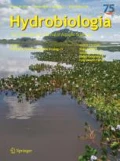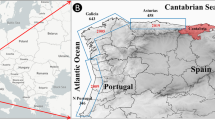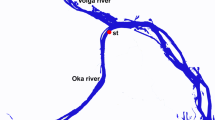Abstract
The recent decline in taxonomic studies is well recognized. Algae-related papers (390) published in five leading limnology journals (1971–2004) were consulted to assess similar trends in limnology by taking algae as a test aquatic group. The study showed a decrease of algae-only studies and an increase of multi-group studies (algae plus one or more aquatic groups). Identification of species decreased while mentioning of ecological groups (phytoplankton, epiphytes, etc.) increased while presenting results. Species identification, however, was not associated with number of aquatic groups or number of algal species included in a study. Problems probably lie with the old-fashioned image of taxonomy and it being threatened by the recent advancement in evolutionary and molecular biology. Issues like the changing research patterns in freshwater ecology, scope of limnological works, its workers and relevant journals are also shaping the status of traditional taxonomy in limnology. Practices such as giving of at least (algal) genera in community studies, and of the current names of studied species in physiological/molecular works and also in studies on particular supra-generic taxa (Class, Family, etc.), could help sustaining of taxonomy in limnology.
Similar content being viewed by others
References
A. J. Beattie I. Oliver (1994) ArticleTitleTaxonomic minimalism Trends in Ecology and Evolution 9 488–490 Occurrence Handle10.1016/0169-5347(94)90250-X
M. L. Blaxter (2004) ArticleTitleThe promise of a DNA taxonomy Philosophical Transactions of the Royal Society of London B 359 669–679 Occurrence Handle10.1098/rstb.2003.1447 Occurrence Handle1:CAS:528:DC%2BD2cXkvF2jt7o%3D
F. Boero (2001) ArticleTitleLight after dark: the partnership for enhancing expertise in taxonomy Trends in Ecology and Evolution 16 266 Occurrence Handle10.1016/S0169-5347(01)02133-4 Occurrence Handle11301157
J. Bramley (1994) ArticleTitleBiodiversity in freshwater ecosystems: the need for an aquatic plant taxonomy course? Freshwater Forum 4 216–218
F. P. D. Cotterill J. M. Dangerfield (1997) ArticleTitleThe state of biological knowledge Trends in Ecology and Evolution 12 206 Occurrence Handle10.1016/S0169-5347(97)84103-1
K. Queiroz Particlede P. D Cantino (2001) ArticleTitlePhylogenetic nomenclature and the Phylocode Bulletin Zoological Nomenclature 58 254–271
H. Disney (1998) ArticleTitleRescue plan needed for taxonomy Nature 394 120 Occurrence Handle10.1038/28027 Occurrence Handle1:CAS:528:DyaK1cXksFOqtr0%3D
H.-J. Elster (1974) ArticleTitleHistory of limnology. Mitteilungen Internationale Vereinigung für theoretische und angewandte Limnologie 20 7–30
H. C. J. Godfray (2002) ArticleTitleChallenges for taxonomy Nature 417 17–19 Occurrence Handle10.1038/417017a Occurrence Handle1:CAS:528:DC%2BD38XjsFOgt78%3D Occurrence Handle11986643
K. J. Gaston M. A. O’Neill (2004) ArticleTitleAutomated species identification: why not? Philosophical Transactions of the Royal Society of London B 359 655–667 Occurrence Handle10.1098/rstb.2003.1442
G. Harris (1999) ArticleTitleThis is not the end of limnology (or of science): the world may well be a lot simpler than we think Freshwater Biology 42 689–706 Occurrence Handle10.1046/j.1365-2427.1999.00486.x
P. D. N. Hebert A. Cywinska S. L. Ball J. R. Waard Particlede (2003) ArticleTitleBiological identifications through DNA barcodes Proceedings of the Royal Society of London B 270 313–321 Occurrence Handle10.1098/rspb.2002.2218 Occurrence Handle1:CAS:528:DC%2BD3sXktVWiu7g%3D
H. Havskum L. Schluter R. Scharek E. Berdalet S. Jacquet (2004) ArticleTitleRoutine quantification of phytoplankton groups – microscopy or pigment analyses? Marine Ecology-Progress Series 273 31–42 Occurrence Handle1:CAS:528:DC%2BD2cXnt1Krur4%3D
H.Md. Irfanullah (2003) ArticleTitlePresent trends of plant taxonomy in Bangladesh and its future Bangladesh Journal of Plant Taxonomy 10 99–111
X. Irigoien B. Meyer R. Harris D. Harbour (2004) ArticleTitleUsing HPLC pigment analysis to investigate phytoplankton taxonomy: the importance of knowing your species Helgoland Marine Research 58 77–82 Occurrence Handle10.1007/s10152-004-0171-9
M. S. Y. Lee (2000) ArticleTitleA worrying systematic decline Trends in Ecology and Evolution 15 346 Occurrence Handle10884707
R. A. Lewin W. A. Newman (1996) ArticleTitleSpecies concepts: a conciliatory note Nova Hedwigia 112 9–11
O. Lhotský (1998) ArticleTitleSpecies identification as basis for biodiversity evaluation. Verhandlungen Internationale Vereinigung für theoretische und angewandte Limnologie 26 1741–1742
F. Pleijel G. W. Rouse (2000) ArticleTitleLeast-inclusive taxonomic unit: a new taxonomic concept for biology Proceedings of the Royal Society of London B 267 627–630 Occurrence Handle10.1098/rspb.2000.1048 Occurrence Handle1:STN:280:DC%2BD3c3ks1ymsg%3D%3D
C. S. Reynolds (1998) ArticleTitleThe state of freshwater ecology Freshwater Biology 39 741–753 Occurrence Handle10.1046/j.1365-2427.1998.00315.x
C. S. Reynolds V. Huszar C. Kruk L. Naselli-Flores S. Melo (2002) ArticleTitleTowards a functional classification of the freshwater phytoplankton Journal of Plankton Research 24 417–428 Occurrence Handle10.1093/plankt/24.5.417
Science Gateway, 2005. Journal Impact Factor 2003. Location on World Wide Web <http://www.sciencegateway.org/ impact/if03a.htm>, visited on 1 February 2005.
I. Stubauer O. Moog (2000) ArticleTitleTaxonomic sufficiency versus need for information – comments based on Austrian experience in biological water quality monitoring. Verhandlungen Internationale Vereinigung für theoretische und angewandte Limnologie 27 2562–2566
A. G. Valdecasas S. Castroviejo L. F. Marcus (2000) ArticleTitleReliance on the citation index undermines the study of biodiversity Nature 403 698 Occurrence Handle10.1038/35001751 Occurrence Handle1:CAS:528:DC%2BD3cXhsVSqs7k%3D Occurrence Handle10693774
D. M. Williams F. E. Round (1994) ArticleTitleSystematics and science: the role of authority Nova Hedwigia 59 219–223
M. J. Wishart B. R. Davies (1998) ArticleTitleThe increasing divide between First and Third Worlds: science, collaboration and conservation of Third World aquatic ecosystems Freshwater Biology 39 557–567 Occurrence Handle10.1046/j.1365-2427.1998.00306.x
Author information
Authors and Affiliations
Corresponding author
Rights and permissions
About this article
Cite this article
Irfanullah, H.M. Algal Taxonomy in Limnology: An Example of the Declining Trend of Taxonomic Studies?. Hydrobiologia 559, 1–9 (2006). https://doi.org/10.1007/s10750-005-9202-z
Received:
Revised:
Accepted:
Issue Date:
DOI: https://doi.org/10.1007/s10750-005-9202-z




